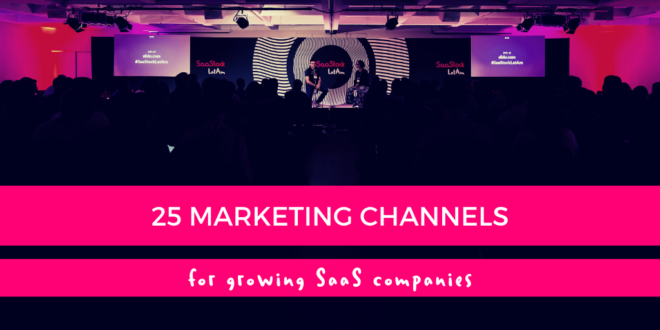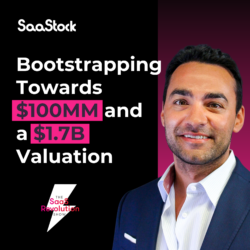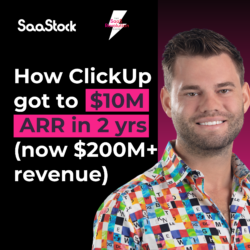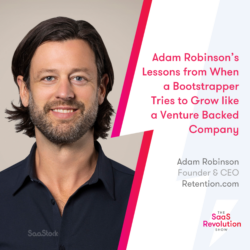There are dozens of different marketing channels, tactics, tools and strategies to consider. I’ve put together an introductory list of 25 common marketing strategies and tactics – but don’t panic! You probably won’t need to implement all of these.
Pick a few that are most closely aligned with your growth levers and targets, and go from there. For example, are you in need of a quick influx of leads, or are you building a long-term foundation for your product? Do you have a freemium offering, or is your buying process longer and more complex?
These are all considerations that will affect which marketing strategies are a good fit for your SaaS company – and conversely which are a poor fit and won’t deliver the results you’re hoping for.
A | B | C | D | E | G | I | L | M | O | P | R | S | V
Account based marketing (ABM)
What is ABM?
Account based marketing is a targeted approach to marketing. Instead of marketing to everyone, you have a small number of target accounts – people or companies who you know will be a good fit for your service. All of your marketing activities are designed to specifically engage with these target accounts.
ABM requires a coordinated effort across multiple marketing channels, for example pay-per-click advertising, retargeting and email nurturing. It also requires strong collaboration across teams, particularly between sales and marketing.
Is ABM right for you?
Account based marketing is best suited to startups selling into the enterprise, or with high annual contract values. If your SaaS has a low price point, the cost of running highly-targeted marketing campaigns will be too much of a drain on your resources, and won’t offer the returns needed to grow your company.
Affiliate marketing
What is affiliate marketing?
Affiliate marketing is where someone earns commission by promoting your companies’ products or services. You create custom links for your affiliates to use, track the links that bring in leads, see how many convert to sales, and pay commission based on that.
For SaaS founders, affiliate marketing offers a couple of opportunities:
- Work with affiliate marketers to bring your product to their audience
- Partnership opportunities with other SaaS companies that offer services complementary to your own, so you each earn commission for referring new customers to each other.
Is affiliate marketing right for you?
If you’re just getting started with SaaS marketing, affiliate marketing is unlikely to be a good fit for you. But for more established SaaS companies it can offer an additional revenue stream if you’re looking to diversify your income.
Affiliate marketing is an interesting additional marketing channel to explore, once you’ve got your core marketing channels working well, bringing in good-fit leads and building brand recognition.
Agile marketing
What is agile marketing?
Agile marketing borrows heavily from the agile software development process. Instead of drawing up a huge year-long marketing strategy, an agile marketing strategy works in shorter sprints.
This makes it easier to adapt, refine and reposition your marketing strategy, doubling down on channels that are driving success, and cutting out ones that aren’t delivering.
Is agile marketing right for you?
In the ever-changing world of SaaS and tech, most companies can benefit from taking an agile approach to their marketing. Staying agile allows marketers to be more responsive than ever before, to focus their effort (and budget) where it delivers.
Brand marketing
What is brand marketing?
To quote Jeff Bezos, “your brand is what people say about you when you’re not in the room.”
It encompasses everything: your visual identity (the way your company looks – from logo and font to illustrative style); your brand voice (the way you say things, as well as what you say); and the way you differentiate yourself from your competitors.
In today’s crowded SaaS market, “brand” can play a surprisingly big role in the buying process.
Is brand marketing right for you?
This is an important channel that most SaaS companies will benefit from investing in. All aspects of your company – your product, your website, your name, and your logo – are part of your brand. When you think of it that way, it’s never too early to get deliberate about brand marketing.
Content marketing
What is content marketing?
Content marketing is the act of sharing helpful resources to attract and engage your target audience, in order to build trust and increase the likelihood that they’ll become your customers. This content can be written (such as blog posts), visual (infographics), audio (podcasts) – or a mix of all three.
Is content marketing right for you?
Many SaaS companies can base their entire marketing strategy on content marketing.
Long-term, content marketing can drive organic traffic to your website, driving down your customer acquisition costs. Short-term, you can focus on things like case studies for social proof to help the sales team, or gated resources for generating leads at the top of the funnel. Its flexibility is one of the reasons content marketing can be so effective in SaaS.
Conversational marketing
What is conversational marketing?
Drift coined the term ‘conversational marketing’. They describe it as:
“a one-to-one approach to marketing that companies use to shorten their sales cycle, learn about their customers, and create a more human buying experience.”
Instead of using lead capture forms and email nurturing to move leads through your marketing funnel, conversational marketing uses chatbots to engage with prospects when they’re on your website.
Is conversational marketing right for you?
Conversational marketing is best suited to companies with predictable, repeatable queries and a transactional sales process where most of the process can be handled by bots.
If you’ve got a complicated product or a complex buying process (for example if you’re selling into the enterprise which often involves jumping through multiple hoops), it’ll be harder to make conversational marketing work for you.
Direct mail marketing
What is direct mail marketing?
Direct mail is a type of marketing where companies send letters, postcards, or other promotional materials to past, current or potential customers, or clients. In today’s digital world, direct mail can be a refreshing alternative to yet another email. It can also be much less competitive – just think, how many emails did you receive today, and how many pieces of physical mail?
However, it’s more expensive to run a direct mail campaign than an email marketing campaign, so you need to be very targeted with who you send it to, to maximise the return on investment.
Is direct mail marketing right for you?
Many companies may benefit from running occasional direct mail campaigns. However, it’s unlikely to be a core marketing strategy for you – done too often, it’ll lose its novelty and you’ll no longer stand out. It’s best thought of as an add-on marketing strategy – not a core customer acquisition channel, but a useful tool to have in your marketing arsenal.
Email marketing
What is email marketing?
Email marketing is where you send emails to your mailing list of leads and subscribers, to provide product updates, newsletters and lead nurturing. Email marketing is one-to-many: you send the same message to the whole list. It’s email messaging done at scale, rather than individually emailing potential customers.
It can seem like every year there’s a new blog post or tool claiming to be the ‘end of email’, but it’s still an incredibly popular (and, done well, effective) marketing strategy.
Is email marketing right for you?
Done well, email marketing can still be an incredibly effective marketing strategy that can work for most SaaS startups. You need a method for communicating directly to your prospects and customers: email gives you a route into their inboxes. Email marketing is versatile and can be personalised to your audience. It’s another marketing strategy that should be at the core of your marketing plan.
Event marketing
What is event marketing?
Event marketing is where you attend, run or exhibit at events as a way of generating new leads for your business.
Most SaaS startups normally begin by attending events (like SaaStock!) as a networking opportunity as much as a learning opportunity. As your business grows, you’ll have the budget to start exhibiting at events. And when your business reaches scale, it’s becoming increasingly common to see SaaS companies launching their own proprietary events – such as HubSpot’s Inbound or Drift’s Hypergrowth.
Events give you the unique opportunity to speak to potential customers one-to-one, face-to-face.
Is event marketing right for you?
If you’re looking to generate new leads, events can be a great place to start – as long as you choose one that’s relevant to your business. You want to be sure that the people you speak to at the event are interested in the area your startup works in – for example, a fintech startup probably wouldn’t attract much interest at an event about edtech.
Additionally, you need to ensure you’ve got the systems and processes in place to follow-up with event leads soon after the event. If you’re not following up for a week or more, you’re essentially wasting money exhibiting at the event, because that person will no longer be a warm lead.
Growth marketing
What is growth marketing?
Traditional marketing focuses on bringing in leads at the top of the funnel, often with activities that drive short-term wins. Growth marketing goes beyond the top of the funnel and acquiring customers, and focuses on the whole of the funnel, including customer retention. It also brings in an element of experimentation normally associated with growth hacking.
Is growth marketing right for you?
Taking a whole-funnel approach to your marketing can be beneficial to all SaaS companies once they have a functioning marketing strategy that successfully generates leads and customers. However, if you’re just getting started with SaaS marketing, you might want to focus on just a couple of lead generation or customer acquisition strategies first, before broadening your focus to the whole funnel.
Inbound marketing
What is inbound marketing?
Inbound marketing is a methodology made popular by HubSpot, that puts the focus on your customer and their needs, rather than on your company or product.
Inbound marketing is used to attract ideal customers to your website, educate them with high-value content, and nurture them to a point where they’re ready to buy. It’s about building trust, and helping people find your product and service when they need it, rather than pushing a sale as soon as they land on your website.
Is inbound marketing right for you?
Inbound marketing is a methodology that applies to many marketing strategies: content, email, social media, PPC advertising, conversational… and more. As the methodology can be applied to many different channels, most startups can benefit from following the inbound marketing methodology.
Influencer marketing
What is influencer marketing?
Influencer marketing is where companies partner up with the famous faces in their industry – influencers – to promote their products and services.
This often takes the form of paid sponsorship agreements with high-profile social media users, with influencers sharing images or ‘reviews’ of a given brand. Influencers have to make it clear when they’ve been paid to promote a product or service.
Is influencer marketing right for you?
Over the past few years influencer marketing has soared in popularity. However, it’s a much better fit for consumer goods than SaaS products – not least because in SaaS there’s no physical product to show.
That said, if you have a handful of big-name customers who are well-known in their industry, you may be able to leverage their influence if they’re happy to provide you with a review, testimonial or video.
But even if that’s the case, influencer marketing is likely to just be a niche, supplementary marketing strategy, not a core strategy for growing your company.
Lifecycle marketing
What is lifecycle marketing?
Lifecycle marketing uses the inbound methodology to break a customer’s lifecycle down into several stages: visitor, lead, marketing qualified lead, sales qualified lead, opportunity, customer.
You then create different types of content for each lifecycle stage, and provide that different content to customers as they move through each stage of their lifecycle. The idea behind lifecycle marketing is that potential customers want more detailed information about your SaaS product and business as they get closer to making a purchase, so when they’re just a lead you focus more on education and problem-solving, and when they’re an opportunity to show more of the benefits of your solution.
Is lifecycle marketing right for you?
Recurring revenue is the lifeblood of all SaaS businesses, which means you need to market to your existing customers as well as new leads. This means all SaaS companies can benefit from lifecycle marketing.
Marketing automation
What is marketing automation?
Marketing automation is the process of using software to automate marketing activities. Many companies automate repetitive, predictable tasks such as email marketing and social media posts.
It’s important to remember that marketing automation is a tool, not a strategy in its own right. To be successful when using marketing automation solutions, it requires a clear strategy for the processes you’re automating with this technology.
Is marketing automation right for you?
As your SaaS company grows, it’ll be impossible to run all your marketing activities manually. Therefore marketing automation will be a good fit for all SaaS companies. However, it’s important not to try and automate everything – your prospects will be able to tell the difference, and a personal touch still goes a long way. As the old adage goes, people do business with people.
Outbound marketing
What is outbound marketing?
Outbound marketing is the opposite to inbound marketing. While inbound marketing is designed to attract ideal customers to your website, outbound marketing aims to reach your potential customers by being the loudest voice in the room.
Outbound marketing uses channels like tradeshows, cold calling and traditional advertising to share a marketing message with as many people as possible, and encourage “cold” prospects to take a desired course of action.
Is outbound marketing right for you?
Outbound marketing is a valuable addition to your SaaS company’s marketing strategy. However, research shows that it takes 18 or more dials to connect with a prospect over the phone, so you’ll be most effective combining outbound marketing with other marketing strategies.
Partnership marketing
What is partnership marketing?
Partnership marketing is about collaborating with another business because they have a relationship with an area of a market that you’re interested in selling to. By partnering with that company, you’re able to introduce your brand to a new audience, while benefiting from your partner’s established reputation in that market.
Is partnership marketing right for you?
Partnership marketing works best for SaaS companies that share an ideal customer profile, but are operating in non-competitive spaces, with no overlap in their product functionality.
Partnership marketing may be an effective marketing strategy once your SaaS is established in its niche and you have a good feel for who your ideal customers are. But until you reach product-market fit it’s likely too early for you to pursue partnership marketing opportunities.
Pay per click marketing / PPC marketing
What is PPC marketing?
PPC stands for pay-per-click, a model of advertising where you pay a fee each time someone clicks on one of your adverts. Put simply, it’s a way to buy traffic to your website.
The most popular forms of PPC marketing are search engine advertising and social media advertising. In both cases, paid-for adverts receive greater visibility than organic search results.
Used successfully, PPC marketing can offer a boost in website traffic and brand awareness, but it can be expensive – especially if you’re in a crowded market and running adverts bidding on competitive keywords.
Is PPC marketing right for you?
For most SaaS companies, PPC marketing is likely to be a core marketing channel. It’s a reliable way to drive an increased volume of traffic to your website, compared to organic search alone.
Additionally, companies are seeing the reach of their organic content (either posts on social media or ranking pages on search engines) dropping dramatically, with more space and visibility going to paid-for adverts. So to reach your audience with your content, PPC may be your best option.
Podcast marketing
What is podcast marketing?
Podcast marketing is a type of content marketing. Instead of creating blog posts, startups run a podcast show, building an audience of listeners instead of readers. Podcasting is still seen as a niche marketing strategy for many companies, but it’s rapidly growing in popularity.
Unlike blogging, it can be difficult to use your podcast to generate leads. It’s better thought of as a brand-building tool, instead of for lead generation.
Is podcast marketing right for you?
Podcast marketing is difficult to use for lead generation, and is more or a branding tool. So it can be difficult for emerging startups to justify the time and budget needed to produce a podcast regularly enough to build an audience.
However, for startups that already have an established brand, podcast marketing can be a great way to build out that brand and audience in a new medium.
Product marketing
What is product marketing?
Product marketing is the process of bringing a product to market and overseeing its overall success. It sits at the intersection of product, sales, marketing, and your customers. Product marketers focus on marketing to your customers, driving demand, adoption and use of your product.
A key aspect of product marketing is product positioning and messaging. This includes:
- Deciding on messaging ahead of launch.
- Ensuring that your marketing and sales teams understand the product and key messaging.
- Ensuring that your customers understand the product.
Is product marketing right for you?
If you’re a SaaS company, you’ve got a product. If you mention that product on your website, you’re already doing product marketing – even if you’ve never called it that.
Every SaaS company will benefit from taking a deliberate approach to product marketing. It should become a core part of your overall marketing strategy, aligning your marketing with product functionality and customer expectations.
Referral marketing
What is referral marketing?
Referral marketing is often called ‘word-of-mouth marketing’. It’s when someone buys a product or service based on someone else’s opinions, recommendations or influence. For example:
- Recommendations from friends, family or colleagues
- Testimonials and case studies
- Reviews on third-party sites (such as G2, Capterra etc.)
Some companies offer incentives to encourage existing customers to refer their product to a friend, which can be an effective way to acquire new customers.
Is referral marketing right for you?
Most SaaS companies will find referral marketing essential for growing their business. In an increasingly crowded market, referrals can help your SaaS company stand out.
“Founders and marketers have long known the value of social proof when it comes to selling your product or service. But the rise of peer review sites like G2 or Capterra have put user reviews at the heart of the software buying process.” – SaaStock
As review sites grow in popularity, referral marketing will play an increasing part of your customer acquisition process. Customer testimonials have always been valuable for growing startups. But the modern SaaS buying process is starting to rely on word-of-mouth and referrals more than ever before.
Search engine marketing
What is search engine marketing?
Search engine marketing (or SEM) is the process of promoting a website through search engines like Google. Search engine marketing is sometimes confused with search engine optimisation (SEO). The biggest difference is that SEO focuses on content creation and growing organic traffic, while SEO primarily uses paid advertising to appear at the top of key search results. This means SEM can offer short-term gains, while SEO is more of a long-term strategy.
Is search engine marketing right for you?
Search engine marketing is a great way to ensure your website quickly shows up in relevant search results, rather than waiting for pages to rank organically. So most, if not all, SaaS companies can benefit from adding search engine marketing to their marketing strategy. However, it’ll work best in combination with other, longer-term marketing tactics, as it’s unsustainable to rely on search engine marketing as your main source of leads long-term.
SMS marketing
What is SMS marketing?
SMS marketing is a channel that allows businesses to communicate with their customers via text message. It’s normally only used to communicate with existing customers rather than leads, as you need to get explicit permission from that person to text them. SMS marketing is a popular way to share special offers or new product announcements.
However, it’s important to know that SMS marketing is a very divisive marketing channel. Some customers will love the convenience of having a coupon code sent to them; others will find it invasive.
For more on SMS marketing, check out this guide from OptinMonster.
Is SMS marketing right for you?
SMS marketing can be a good fit for SaaS companies that already have an established customer base. But it’s less suitable for use as a lead generation channel. Take time to consider whether SMS marketing aligns with your top-level marketing goals. It will generally be a better fit for more established SaaS companies than early-stage ones who are still finding their place in the market.
Social media marketing
What is social media marketing?
Social media marketing is where you use social media to promote your company and product. To reach the largest audience, social media marketing combines a mix of organic posts and paid-for advertising.
As well as providing a chance to share content with your target audience, social media also provides customers with a direct line of communication with you. This makes social media a great place to generate engagement around your product.
Is social media marketing right for you?
Social media should be a key marketing channel for most SaaS businesses.
As of 2019, there are 1.6 billion daily active users on Facebook and millions more across LinkedIn and Twitter. If your SaaS business isn’t on social media, just think about what you’re missing out on. People expect to be able to find and engage with you on social media.
Not using social media can even be a turn-off for your potential customers. If your SaaS company is just getting started, on-brand social media profiles make your company seem more reputable and legitimate – essential for attracting those crucial early customers.
Video marketing
What is video marketing?
Video marketing is a type of content marketing. YouTube is widely regarded as the second most popular search engine in the world. Social media posts containing videos receive a greater share of views, clicks and engagements than posts without. There’s never been a better time to add video to your marketing efforts.
Is video marketing right for you?
If content marketing is a core marketing strategy for your business, you should consider adding video marketing into the mix.
It used to be that to make videos you’d need an expensive camera, the right lighting, a mic, and who-knows-what-else. Today, all you need is a smartphone. Video marketing is more accessible than ever, and with Youtube standing its ground as the second most popular search engine, can you really afford not to use video marketing in your marketing strategy?
Viral marketing
What is viral marketing?
Viral marketing is a type of referral marketing, designed to harness the power of social media for raising brand awareness.
Viral marketing typically uses sites like Facebook, YouTube, Reddit or Product Hunt to promote shareable snippets of content or special offers. If these snippets “take off” in the community it’s been shared in, companies can rapidly generate hundreds of thousands of shares, impressions, visits, and sales.
Is viral marketing right for you?
Speak to any SaaS founder and chances are, they’d love their product to go viral. But in practice, viral marketing only delivers for a handful of companies. It’s hard to predict, and hard to successfully execute. So it’s unlikely viral marketing should be at the heart of your marketing strategy.
And even if some of your content or a special offer does go viral, it’s important to remember it’s only a short-term gain. Viral marketing doesn’t last forever – it’ll only give you a temporary uplift in visitors, impressions and sales.
What to read next
Looking for more information about SaaS marketing? Here are some articles to add to your reading list:




















